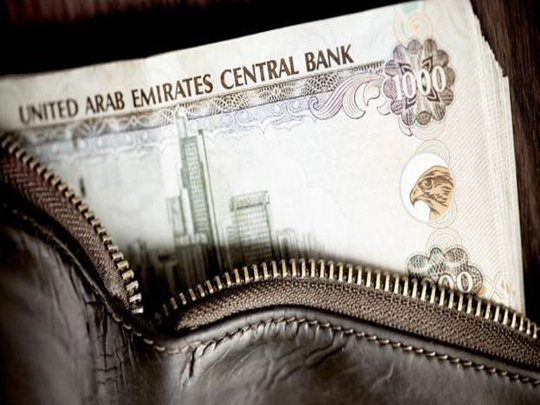Dubai: We have all found ourselves in the situation – a close friend or acquaintance is in financial need and asks for help. It could be a request for anything from Dh500 to Dh50,000, with a gentleman’s agreement to return it within a set period of time. But what happens when the informal contract is violated? This was the query raised by a Gulf News reader.
He said: “I lent Dh7,000 to a friend earlier this year, when he was in financial stress. Now, when I am asking him to repay the loan, he is either not picking up my calls or telling me that he is still not in a position to return the money. I also have a family here and the money is important for me. What can I do to get my money back? I have Whatsapp conversations with him when he asked me for the money. I paid him in cash. Can I file a police complaint and is there any other way to get my money back? I don’t want to get him in trouble, but I also really need him to return my money. What I should do?”
When it comes to friendly loans, if you have given money to an acquaintance, there are a few aspects that need to be considered, according to Mohamed Gamal, Legal Adviser at Kaden Boriss Legal Consultants Dubai.
He referred to various articles in Federal Law No. (5) of 1985 On the Civil Transactions Law including whether the lender has a right to claim their money back and the next steps he can take.
“Money is everything that can be physically or morally acquired and used and is legitimate. The dirham is considered money, cars are considered money and ideas are also considered money. But to ask for it, the claimant must have a ‘source of obligation’,” Gamal said.
He went on to explain how Article 124 of the Civil Transactions Act describes what are the accepted ‘sources of obligation’, which grant legal rights to individuals to make claims.
“The claimant (reader) must have the proof of transferring the money. The may be proven by any of the following methods: writing; by having a witness; acknowledgement and pledge; context; expert preview; or right. In this case, your WhatsApp messages are a proof of writing, as it will be accepted by the Evidence Act and a precedent set by the Court of Cassation,” Gamal added.
“In order to claim the right to do so, you must notify the claimant of the refund within a minimum period of 15 days. Then prepare a memorandum of the details and go to a civil court to claim your right. The judiciary is now available easily and conveniently and the courts provide excellent services. The case fees must be paid, which is six per cent of the claim value, which you can recover in the execution stage,” he added.
The claimant (reader) must have the proof of transferring the money … In this case, your WhatsApp messages are a proof of writing, as it will be accepted by the Evidence Act and a precedent set by the Court of Cassation.
The six per cent claim value as court fees is capped at a maximum of Dh40,000.
He also spoke about how individuals can reach out to police authorities, but cannot enforce any action of recovery in the case of friendly loans.
“The money that was transferred to your friend is not a case theft or breach of trust, so the police can only resort to friendly demands, because the money transfer was your will,” he said.
How you can protect your rights
Hari Wadhwana, Associate, OGH Legal, spoke about how Federal Law No. 5 of 1985 provided the space for individuals to grant loans. However, they cannot charge any interest on the loan amount.
“In particular, Article 710 of the said Law allows granting of loan provided that the borrower returns the loan of the same value, and reaffirming the principle of no-interest loans. This is for two reasons – the individual granting the loan is not registered with the UAE Central Bank to charge interest on the loan granted and also interest in private transactions is against the public policy in UAE. This is where the concept of ‘friendly loans’ arises and allows parties to grant loans to each other on a principal-only basis,” he said.
Why you can’t charge interest on friendly loans – the individual granting the loan is not registered with the UAE Central Bank to charge interest on the loan granted and also interest in private transactions is against the public policy in UAE. This is where the concept of ‘friendly loans’ arises and allows parties to grant loans to each other on a principal-only basis.
In order to protect your rights when you lend money to a friend, Wadhwana provided the following tips and best practices.
Dos and don’ts before giving a loan
• Remember – you cannot take interest on a friendly loan in the UAE. As mentioned earlier, an individual must never grant a loan on interest, as it is likely that the lender will not be able to enforce this in a court of law. Further, the lender may face legal action for conducting banking activities without being licensed to do so.
• Always document your agreement. This agreement should have necessary elements like, amount of loan, mode of payment, term of loan, return date, governing law and security against the loan. Of course, the list is only indicative and not exhaustive in nature. It is strongly suggested to seek assistance from a lawyer for such transactions and not use standard templates from the Internet as every transaction is unique and will require tailor-made agreements. Parties, especially the lender, will stand to lose much more if the agreement is not strong.
• Avoid paying in cash. It is advisable to pay either by checque or bank transfer, as it documents the transfer of money. If the payment was made in cash, the borrower may deny receiving the money and it may become difficult to prove the actual transfer of loan.
• Take a security cheque. The lender must take a security cheque from the borrower in exchange for the loan. This is to ensure that if the borrower defaults in repayment, the lender can take swift action.
• Don’t sign a blank cheque. No matter how desparately in need of money you are, never sign a blank cheque, as it can be easily misused. Always fill in the date and amount on the cheque to ensure your rights are protected as a borrower.
• Try to get a third party to witness the agreement. “Though this is not critical, it ensures that the borrower does not dispute whether the signature on the loan agreement is his,” Wadhwana said.
Dos and don’ts after giving a loan
• Meet the deadlines for payment under the loan as you wouldn’t want to give the lender an opportunity to threaten legal action.
• Once repayment is done, the borrower should ensure they collect any security cheques, if provided, and take a clearance letter from the lender confirming the loan has been repaid.
• Just how the loan was given through a bank transfer or cheque, the repayment must also be done in a similar fashion to avoid any disputes.





